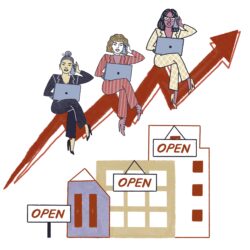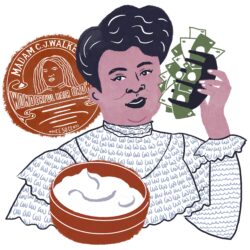Key facts and figures on the impact of women-owned businesses in the U.S.
By Lucciana Choueiry
Illustrations by Jessica Wetter
In celebration of Women Entrepreneurs Day on November 19, it’s important to recognize the vital role women play in the U.S. economy. Women now own 39.1% of businesses, generating trillions in revenue. Black women have driven a 50% surge in new businesses, following the legacy of trailblazers like Madam C.J. Walker. Despite challenges, women-led companies continue to grow at double the rate of others, reshaping the future of business.

39.1%
Women entrepreneurs are proving to be a driving force in the U.S. economy, now owning 39.1% of all businesses. According to the 2024 Wells Fargo Impact of Women-Owned Business Report, these women-led companies employ 12.2 million people and generate an astonishing $2.7 trillion in revenue. And during the pandemic, while many businesses faltered, women-owned firms added more than $500 billion to the economy. The ability to adapt and thrive through challenges is a testament to the resilience of women entrepreneurs, positioning them as key players in shaping the future of American business.
50%
Between 2014 and 2019, Black women-owned businesses surged by 50%, according to JP Morgan. During this time, Black women accounted for 42% of new women entrepreneurs. This mirrors the journey of Madam C.J. Walker, the first Black woman entrepreneur and self-made millionaire. Born Sarah Breedlove in 1867, Walker started her hair care business with just $1.25 after years as a washwoman. By 1910, she invested $10,000 to fully own the Walker Manufacturing Company. At her death in 1919, Walker had become one of the wealthiest women in America, paving the way for future Black women entrepreneurs.

$3 trillion
Women entrepreneurs are essential to economic growth and job creation globally. In the U.S., women-owned businesses are expanding at double the rate than others, contributing nearly $3 trillion to the economy and creating millions of jobs, according to World Bank. However, access to finance remains a major challenge, with many women relying on personal savings that restrict long-term investment in their ventures. Despite these hurdles, the resilience and creativity of female entrepreneurs continue to drive innovation and inspire future generations.



